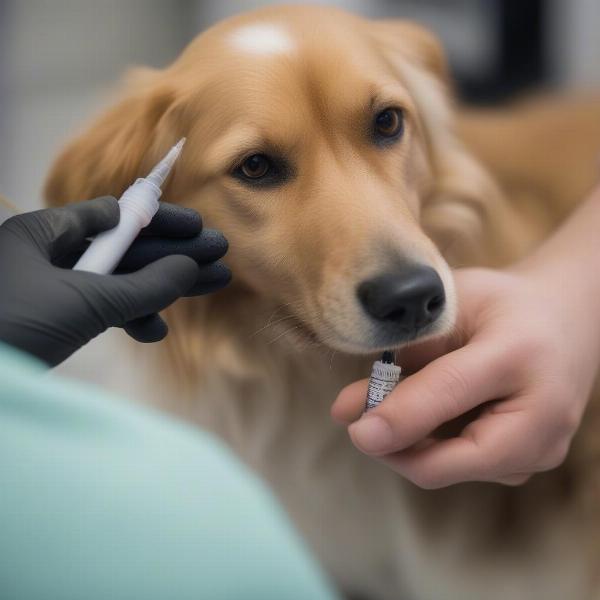A dog ID card is a simple yet powerful tool for ensuring your furry friend’s safety. Whether you’re a seasoned dog owner or just starting your journey with a canine companion, understanding the importance and different types of dog ID cards is crucial. From traditional tags to microchips and digital alternatives, these identification methods offer peace of mind and play a vital role in reuniting lost dogs with their families. This article delves into the various options, benefits, and legal considerations surrounding dog identification.
Choosing the Right Dog ID Card
Selecting the right ID for your dog depends on various factors, including your lifestyle, your dog’s temperament, and local regulations. Traditional tags are the most common and affordable option. These small metal tags attach to your dog’s collar and display essential information like their name, your phone number, and address. However, tags can get lost or become illegible. Microchipping is a permanent form of identification. A tiny chip, about the size of a grain of rice, is injected under your dog’s skin and contains a unique identification number. This number is registered in a database along with your contact information.
 Microchip Injection for Dog Identification
Microchip Injection for Dog Identification
Digital Dog ID Cards: A Modern Approach
Digital dog ID cards are gaining popularity as a convenient and comprehensive solution. These platforms allow you to create a profile for your dog with their photo, medical information, vaccination records, and emergency contacts. Many platforms also offer features like lost dog alerts and community support. Some digital options even sync with microchip registries for added security. If your dog is a service or assistance animal in the UK, specific regulations may apply to their ID card. For more information on assistance dog ID cards in the UK, please refer to our dedicated article: assistance dog id card uk.
The Legal Aspects of Dog Identification
Many jurisdictions require dogs to wear a collar and tag with the owner’s contact information. Check your local laws to ensure compliance. Microchipping requirements also vary depending on your location. Some areas mandate microchipping for all dogs, while others recommend it. Understanding the legal requirements in your area helps you ensure your dog’s safety and avoid potential penalties. You can even consider getting a free service dog ID card. Find more details on our page: free service dog id card.
Ensuring Your Dog’s Safety: Beyond the ID Card
While a dog ID card is a crucial first step, taking extra precautions is always advisable. Regularly check your dog’s collar and tags for wear and tear, and ensure the information is up-to-date. Keep your microchip registration information current, especially if you move or change phone numbers. Training your dog to respond to their name and basic commands also enhances their safety.
What if My Dog Gets Lost?
If your dog goes missing, contact your local animal shelters and veterinary clinics immediately. Provide them with a clear description of your dog, including their breed, color, and any distinguishing features. If your dog is microchipped, notify the microchip registry. Utilizing social media platforms and lost pet websites can also help spread the word and increase your chances of a quick reunion. Remember, sending a dog death card is an act of compassion for grieving pet owners.
Conclusion
A dog ID card is an essential investment in your dog’s safety and well-being. From traditional tags to microchips and digital solutions, choosing the right combination ensures your peace of mind and increases the chances of a happy reunion if your furry friend ever goes astray. Stay informed about local regulations and take proactive steps to keep your dog safe.
FAQs
-
Is microchipping painful for my dog? The procedure is similar to a vaccination and is generally well-tolerated.
-
How do I update my microchip information? Contact the microchip registry your dog is registered with.
-
What information should I include on my dog’s ID tag? Your dog’s name, your phone number, and your address.
-
Are digital dog ID cards reliable? Yes, they offer a convenient and comprehensive way to store and access your dog’s information.
-
What should I do if my dog’s ID tag gets lost? Replace it immediately with a new one containing updated information.
-
Are there any specific ID requirements for service dogs? This depends on your location; check with local authorities.
-
Do I still need a tag if my dog is microchipped? Yes, a tag provides immediate identification, while a microchip requires a scanner.
ILM Dog is a leading international online resource dedicated to providing expert advice and information on all aspects of dog care and wellbeing. From breed selection and health to training, nutrition, and grooming, ILM Dog offers practical, reliable resources for dog owners worldwide. We specialize in providing guidance on dog breeds, health, training, nutrition, and product recommendations. For further assistance or inquiries, contact us via email at [email protected] or phone at +44 20-3965-8624. Visit ILM Dog for comprehensive and trustworthy information on everything related to dog care. We also provide a selection of holiday cards, including holiday dog christmas cards. And for dog health, we offer information on cardalis for dogs.